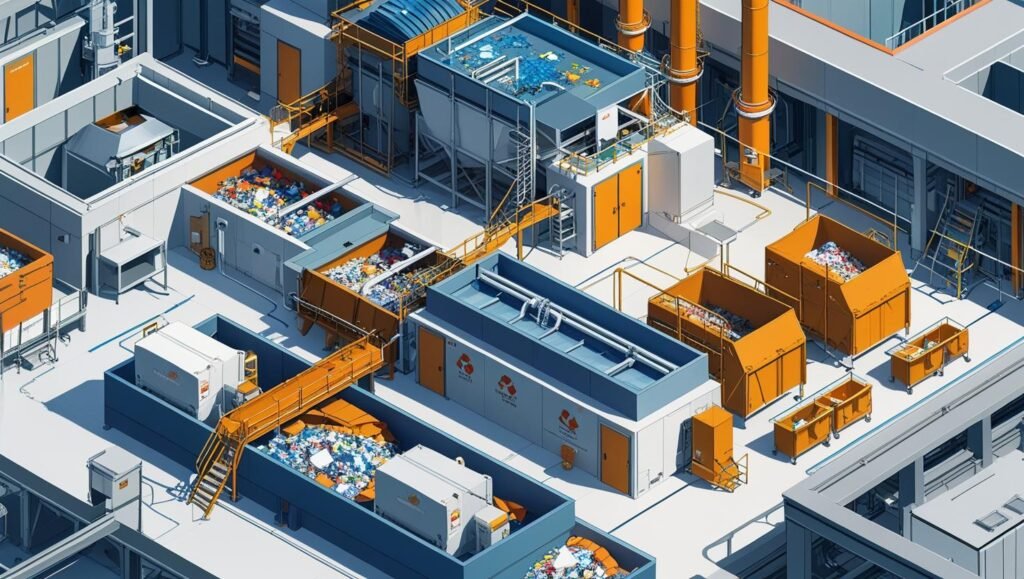Have you ever wondered where all your daily waste ends up? Whether it’s leftover food, electronics, packaging, or biomedical materials, improper disposal is the biggest challenge faced on our planet today.
From contaminated waterways to overflowing landfills, mismanaged waste has a significant impact on both the environment and human health. As towns and cities continue to urbanize, the complexity and volume of garbage increase, highlighting the immediate need for efficient and sustainable waste segregation solutions.
Scientific waste management offers an eco-conscious and structured approach to handling waste, further ensuring minimal harm to public health.
This type of waste treatment method combines scientific principles and environmentally friendly techniques to process, sort, and dispose of waste in a single location.
Keep reading as we explore the types, implementation challenges, and social and environmental impacts of scientific waste management.
What is Scientific Waste Management?
Scientific waste management is a systematic process of handling waste following scientific methods. It involves multiple stages, including waste segregation at the source, collection, transportation, treatment, and sustainable waste disposal.

- Every stage requires proper planning and monitoring to ensure safe waste disposal and to protect the surrounding environment.
- Waste segregation does play a foundational role. It involves finding and separating biodegradable, non-biodegradable, and hazardous waste from the point of origin. It simplifies recycling, composting, and safe disposal.
Waste handling treatment varies by type; while the organic waste gets composted, the biomedical waste requires incineration. The final disposal, preferably in engineered landfills, brings in no long-term environmental damage.
Our collection systems are well-equipped, and we use specialised bins and vehicles for hazardous waste disposal. We ensure waste disposal transportation happens with no contamination or spillage.
Types of Waste Managed Scientifically
You might be thinking that all waste is the same, but in reality, there are different categories that need specialised handling. Let’s break them down:
- Biodegradable waste includes garden waste, food scraps, and paper. All these can be effectively composed into useful organic fertilisers.
- Non-biodegradable waste like metals and plastics does not decompose naturally. Both these items need to be sorted out first and then sent for plastic waste recycling purposes.
- Hazardous waste holds onto toxic substances like chemicals, batteries, or even pesticides. Improper disposal of these items can contaminate both soil and water.
- Biomedical waste like gloves, syringes, and infected materials needs to be incinerated under strict conditions to prevent potential disease spread.
- Electronic waste, or e-waste, includes discarded electronic items dismantled for reuse or for recycling purposes.
All of these different types of waste require following distinctive waste treatment methods. Our scientific waste management services ensure appropriate. Addressing every kind of waste found in our place.
Environmental Impacts of Scientific Waste Management
The most significant benefit of scientific waste management is the positive impact it has on the environment. When waste gets dumped, it can pollute the surrounding air, soil, and water.
- Scientifically handling the waste removal process minimizes such effects. By reducing open burning and dumping, air, soil, and water pollution is minimized, further safeguarding the ecosystem.
- Scientific methods do reduce greenhouse gas emissions, primarily methane that gets released from organic waste in landfills. Instead, we either follow composting or bio-digestion to capture these gases for energy use. This way, we turn potential problems into a valuable resource.
This kind of system, followed by our experts, helps protect biodiversity. Proper waste disposal prevents any hazardous substances from entering natural habitats, reducing harm to plant life and wildlife.
Scientific landfilling and recycling can improve your land use efficiency, converting waste-filled zones into green space or even energy centers over time.
We use liners in landfills to prevent contaminated water from entering into groundwater. Air pollution in your facility can be reduced by using filters in incinerators that tend to avoid the release of harmful gases.
Social Impacts of Scientific Waste Management
You may be unaware of the possible ways waste disposal can affect the quality of your life. Improper waste disposal will only lead to creating unhygienic conditions that attract pests and spread disease. Uncollected garbage during the monsoon season instantly turns the place into a breeding ground for rodents and mosquitoes.
Scientific waste management has numerous social benefits, especially when followed in densely populated areas:
- It improves public health by reducing the breeding grounds for pests that tend to spread diseases. It even cuts down on human exposure to toxic substances.
- It supports local economies by creating jobs in waste collecting, processing facilities, and recycling units. Both skilled and unskilled labour benefit from this sector’s growth.
- Such practices do promote civic responsibility, further encouraging citizens to segregate waste and even participate in zero-waste practices correctly.
By incorporating scientific waste management, every community will enjoy living in clean spaces, completely free from pests and foul smells.
Challenges in Implementation
Despite the added advantages, there are several challenges that restrict the widespread adoption of scientific, eco-friendly waste management. One crucial challenge is the lack of public awareness. Many people are still unaware of the difference between non-biodegradable and biodegradable waste and the proper ways to separate them.
- Lack of public awareness will only lead to poor waste segregation at your source. It further makes recycling and waste management treatment more difficult and costly.
- Infrastructure gaps, especially in underdeveloped or rural areas, waste in any form most often goes untreated or uncollected.
- Technical and financial limitations do restrict the ability of municipalities to invest in the latest waste treatment systems.
- We suggest solutions like public education campaigns to let everyone understand waste segregation and recycling and the need to hire services from companies like us.
- Community involvement is crucial, and it can be done by teaching children to segregate waste in their places correctly. Municipalities and governments must enforce strict waste management practices and invest in waste removal services as handled by our experts.
Conclusion
Scientific waste management is not just a disposal method; it’s a pathway to create and maintain a healthier planet and society.
Starting from preserving ecosystems and minimizing pollution to protecting public health, the health benefits of proper waste management are vast and essential.
At Northamps, we have been providing integrated solutions for waste disposal.
Our experts are one phone call away to understand your waste disposal needs and blend the right mix of technology to create a sustainable future.


